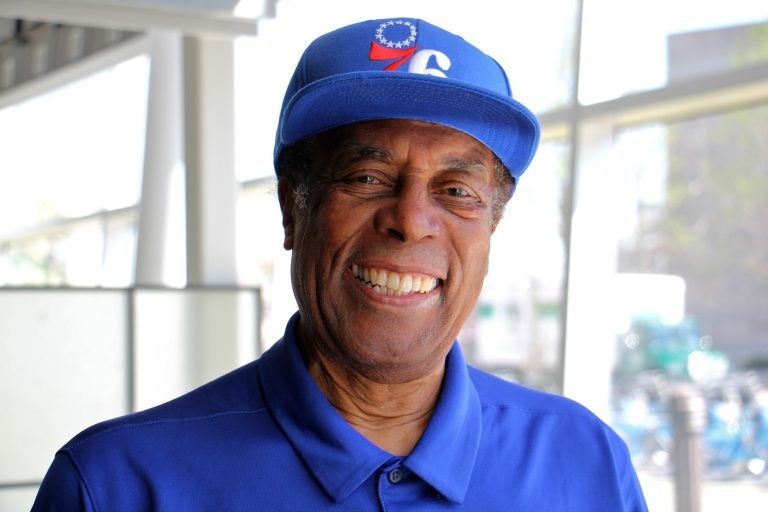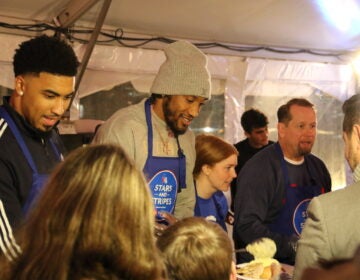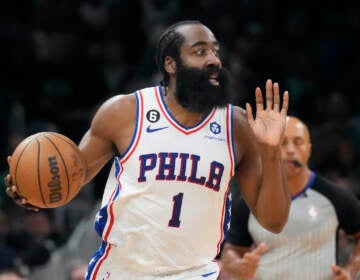Staying power: Sonny Hill celebrates 50 years in the broadcasting industry
The host of "In the Living Room," which airs Sundays on 94WIP Sportsradio, spoke to WHYY’s “Morning Edition” host Jennifer Lynn about breaking new ground.
Listen 6:51
Sonny Hill of 94 WIP has been working in radio for 50 years. (Emma Lee/WHYY)
Philadelphia native Sonny Hill is the host of 94WIP Sportsradio’s Sunday morning radio show, “In the Living Room.” But it’s just one piece of Hill’s 50 year career in broadcasting.
Hill, born in 1936, played pro basketball in the Eastern Basketball League when black athletes, like him, were overlooked for white players in the early years of the NBA. He worked as a radio analyst for the 76ers in the 60s and was an NBA commentator for CBS TV in the 70s.
WHYY’s “Morning Edition” host Jennifer Lynn spoke with him about breaking in and breaking through.
—
You can’t look at 1936 and say that you’re going to be in broadcasting for 50 years because, first off, only a few people had radios. TV was almost nonexistent. And opportunities for people from my ethnic group were nonexistent. My journey is not supposed to happen.
So, born in 1936. That’s when my mother was born.
There you go. Eighty-two years old, going into 83.
And fit. You’re super fit.
Yes. Well, that’s a blessing. It’s not supposed to happen.
Yeah.
I come across people all the time, and you know people start talking, “Well you know, I’m this and that.” I say, “Excuse me. I think I’m a little older than you.” I say, “I’m 82.”
“What water are you drinking? What’s going on?”
They want to know.
So you have to appreciate the fact that He’s sending a message through me. And as long as I continue to deliver the message in the way He wants, He’ll continue to reward me. He’s not finished with me yet. He’ll let me know.
And he is your God. As a young person, very athletic, you could play anything pretty much. There was no talk of going to college in the household.
And then you’ve heard, you’ve heard that.
Yeah. But you use sports to do a lot of things, and you went to college.
Yes.
And you became a basketball player.
Yes.
And you became a broadcaster.
Yeah.
What did you do for the 76ers?
Started 76 years in 1969.
On the radio?
On radio.
You have a beautiful voice. You know the sport. Yeah, I mean for me, you’d be a great candidate. But I’m sure.
No, not, not then, not 1969.
No, it was not easy.
Because it’s still racial. In fact, in the NBA at that time, I don’t think they had five teams that had analysts, and we probably had at that time maybe 12 to 14 teams in the league.
Well, how did you crack that open to get in as a broadcaster?
I think the way that I had conducted myself in everyday life, and how I built a name and a reputation in this area through high school, through independent basketball, which was big back in the day. As I’ve said on my radio show, my grandmother raised me to be a person who could interact with people and respect people and command respect on the other end. By the way that you carried yourself. So all of that is a part of how you are able to get on this journey, and to be on this journey for the many years that I’ve been here.
You are a broadcast pioneer — a groundbreaker — but you say that came at a price.
And the price is when you are groundbreaker, you don’t get all of the residuals that other people may get as they come in. When I was at CBS, I was conscious of the fact that I was not representing me, Sonny Hill. I was representing us as African-Americans — as blacks. And at the time that I started in ’72, as Negroes and colored. And I felt that I had a responsibility to send a message more to the people outside of our immediate involvement. And maybe in the South, people had a different perspective of how we carried ourselves as people outside of their ethnic group. So, it was important for me to be able to present myself in a manner that would bridge the gap from a distance. But now, they could see it up close. If you can look a certain way and you can speak a certain way, you capture them. And now, we have all these people that are now in the business particularly from a minority point of view, and they don’t have to worry about it as much because it was a person like myself — I’m not the only one, but I was in the forefront of breaking down that barrier — so that we could gain the kind of respect that we deserved.
Sonny, you have a way of not talking at your listeners in the living room, which is what you call your radio space. You have callers call in, and you’re there to greet them and talk about any number of things. It can be sports. It can be Frank Sinatra.
This past week was Nat King Cole’s 100th birthday.
That was a great conversation.
Yes.
And, in fact, you said to me before you came today you don’t do interviews, you do conversations.
What I like to do every now and then, more now than then, is let me tell your story. And that way we connect, or let me tell you how much I respect you. You’ve probably called in on a number of occasions, and I’ve gotten to know you through that, or you’re just a caller that’s calling the first time. But I can feel what kind of human being you are. And then they go back telling people I was in the living room and Sonny treated me this way. It’s a great feeling.
WHYY is your source for fact-based, in-depth journalism and information. As a nonprofit organization, we rely on financial support from readers like you. Please give today.





